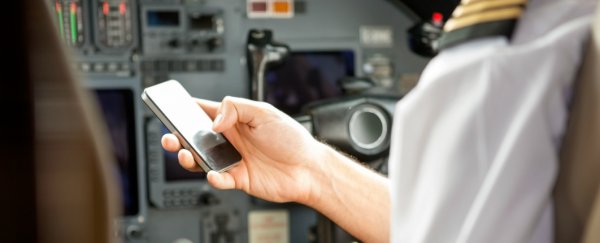A US appeals court has ruled that passengers can keep their smartphones and other electronic devices turned on during take off and landing, as long as they're in airplane mode, despite attempts by flight attendants to overturn the decision.
The policy change was first made in 2013 by the US's Federal Aviation Administration (FAA), after more than 20 years of research found no safety risk associated with using electronic devices in flight. But the Association of Flight Attendants promptly sued the FAA, and tried to overturn the decision, claiming that passengers are now too distracted by their phones and iPads to listen to the safety demonstration.
Of course, just because the FAA said it was OK for passengers to use electronic devices throughout the whole flight, doesn't mean that all airlines allowed them to do so. Individual airlines still had to prove that it was safe to continuously use electronics in their planes, but most carriers rolled the change out pretty quickly in order to stay competitive.
In Australia, the Australian Civil Aviation Safety Authority followed suit and updated its regulations in August last year, allowing small electronic devices under 1kg in airplane mode to be used any time during a flight. Airlines Qantas and Virgin jumped on board and changed their policies just a few weeks later.
But in the US, flight attendants weren't happy with the change. In addition to being upset about passengers staring at their phones during their safety demonstrations, they felt that electronic devices could become dangerous projectiles during turbulence, and tried to overturn the FAA decision by saying it had overstepped its authority.
Last Friday, the District of Columbia Court of Appeals tossed out their case, as Sam Hananel reported for Associated Press:
"The appeals court said the FAA has always had discretion on how to handle issues such as portable electronics and was free to change its interpretation of the rules. FAA officials said that cellphones and other small electronic devices were no more dangerous than books that passengers have been allowed to keep out."
And what about those concerns that using electronic devices somehow interferes with the navigational devices? As Ashley Feinberg wrote for Gizmodo back in 2013 when the FAA first announced its decision:
"There has been, in fact, only one recorded instance in aviation history in which a cellphone proved dangerous; in 2009, a first officer became distracted when his phone rang because he forgot to put it on vibrate."
So rest assured that airlines (in the US at least) now have absolutely no reason to go back to the days of forcing you to switch off your electronic devices anymore… ever. And with more and more airlines rolling out on board wi-fi, that's definitely a good thing.
The FAA still won't force any airlines to make the shift to allowing electronics to be always on, but those that still haven't embraced the new policy will more than likely cave to passenger pressure sooner or later. Let's hope the rest of the world catches on soon.
